Key English Test 3 Student's Book with Answers 9780521754798, 0521754798
This collection of four complete practice tests for the Key English Test (KET) has been specially prepared by University
322 18 246KB
English Pages 22 Year 2003
Recommend Papers
File loading please wait...
Citation preview
Cambridge Key English Test 3 WITH ANSWERS
Examination papers from University of Cambridge ESOL Examinations: English for Speakers of Other Languages
PUBLISHED BY THE PRESS SYNDICATE OF THE UNIVERSITY OF CAMBRIDGE
The Pitt Building, Trumpington Street, Cambridge, United Kingdom CAMBRIDGE UNIVERSITY PRESS
The Edinburgh Building, Cambridge CB2 2RU, UK 40 West 20th Street, New York, NY 10011–4211, USA 477 Williamstown Road, Port Melbourne, VIC 3207, Australia Ruiz de Alarcón 13, 28014 Madrid, Spain Dock House, The Waterfront, Cape Town 8001, South Africa http://www.cambridge.org © Cambridge University Press 2003 This book is in copyright, which normally means that no reproduction of any part may take place without the written permission of Cambridge University Press. The copying of certain parts of it by individuals for use within the classroom, however, is permitted without such formality. Pages which are copiable without further permission are identified by a separate copyright notice: © UCLES K&J Photocopiable First published 2003 Printed in the United Kingdom at the University Press, Cambridge Typeface Helvetica 10/13pt. System QuarkXpress® [OD&I] A catalogue record for this book is available from the British Library ISBN ISBN ISBN ISBN ISBN
0 0 0 0 0
521 521 521 521 521
75479 75478 75480 75482 75481
8 Student’s Book with Answers X Student’s Book 1 Teacher’s Book 8 Audio CD X Cassette
Contents To the student
5
Test 1
Paper 1 Paper 2 Paper 3
6 18 25
Test 2
Paper 1 Paper 2 Paper 3
26 38 45
Test 3
Paper 1 Paper 2 Paper 3
46 58 65
Test 4
Paper 1 Paper 2 Paper 3
66 78 85
Visual materials for Paper 3 Test Test Test Test
1 2 3 4
Key Key Key Key
Sample answer sheets
86 94 102 110 118 126
Test 1 PAPER 1
READING AND WRITING
(1 hour 10 minutes)
PART 1 QUESTIONS 1–5 Which notice (A–H) says this (1–5)? For questions 1–5, mark the correct letter A–H on the answer sheet.
EXAMPLE 0
1
ANSWER H
We work fast.
This is not for adults.
A
B 2
You can’t drive this way. C
3
We can help you day and night. D
4
You can have dinner here.
E
F 5
Come here to book a holiday. G
H
6
YOUTH CLUB Under 16s only Half-price drinks with 3-course meals!
CITY CENTRE CLOSED TO TRAFFIC ALL DAY TODAY
Tourist Information open 24 hours NO PETROL STATION ON MOTORWAY TURNER TRAVEL Fly away to the sun this summer
SCHOOL OFFICE CLOSED FOR LUNCH We repair shoes QUICKLY 8 a.m. – 5 p.m.
Paper 1
Reading and Writing
PART 2 QUESTIONS 6–10 Read the sentences (6–10) about Sam’s new computer. Choose the best word (A, B or C) for each space. For questions 6–10, mark A, B or C on the answer sheet.
EXAMPLE 0
Sam’s father A
6
He A
7
B
bought
.............................
paid
C
spent
C
studied
Sam how to use it. B
learnt
message
showed
.............................
B
They were A
B
subject
.............................
happy
10 Afterwards, they A
wanted
A
him a new computer for his birthday.
to his friend Billy to tell him about his nice present.
programme
C
form
Billy came to Sam’s house and they did their geography A
9
.............................
Sam sent an e-mail A
8
ANSWER
B
homework
together.
class
because they found some information about rivers on the internet. interesting
.............................
B
C
.............................
C
pleasant
playing a new computer game together.
thanked
C
enjoyed
7
Test 1
PART 3 QUESTIONS 11–15 Complete the five conversations. For questions 11–15, mark A, B or C on the answer sheet.
EXAMPLE Where do you come from?
11
12
13
14
15
8
Who’s that man with the green sweater?
Where’s Amanda gone?
I hate shopping.
How long did the journey take?
The room costs £55 a night.
A
New York.
B
School.
C
Home.
ANSWER
A
He’s my brother.
B
It’s John’s.
C
I don’t know it.
A
She’s at the station.
B
She’ll arrive tomorrow.
C
She’s going to leave tonight.
A
So do I.
B
Certainly.
C
That’s all right.
A
About 500 kilometres.
B
Almost 5 hours.
C
Last week.
A
I don’t take it.
B
Give me two, please.
C
That’s a lot.
A
Paper 1
Reading and Writing
QUESTIONS 16–20 Complete the conversation in a garage. What does David say to the mechanic? For questions 16–20, mark the correct letter A–H on the answer sheet.
EXAMPLE
ANSWER
Mechanic:
Good morning. How can I help you?
David:
0
E
...........................................
Mechanic:
Certainly. What’s the problem?
David:
16
Mechanic:
How long have you had the car?
David:
17
Mechanic:
Hm, there may be something wrong with the engine.
A
Oh dear. Can you repair it now?
B
That will be fine.
C
Thanks. How much will it cost?
D
It’s only Monday today. I’ll go to another garage.
E
Would you have a look at my car, please?
F
I bought it new about four years ago.
G
It goes at eighty kilometres an hour.
H
It won’t start in the morning.
...........................................
...........................................
David:
18
Mechanic:
I’m afraid we have a lot of work at the moment. I can’t do it until Friday.
David:
19
Mechanic:
Well, I suppose I can do it on Wednesday.
David:
20
Mechanic:
Bring it in at 8.30 in the morning.
...........................................
...........................................
...........................................
9
Test 1
PART 4 QUESTIONS 21–27 Read the article about Howard Bonnier. Are sentences 21–27 ‘Right’ (A) or ‘Wrong’ (B)? If there is not enough information to answer ‘Right’ (A) or ‘Wrong’ (B), choose ‘Doesn’t say’ (C). For questions 21–27, mark A, B or C on the answer sheet.
HOWARD BONNIER Bray is a beautiful village about fifty kilometres west of London. A young Englishman named Howard Bonnier opened a restaurant called The Palace there about three and a half months ago. Not many people in Britain know Mr Bonnier’s name yet, but he’s already quite famous in France. This is because he has written in French magazines about almost all the best restaurants in that country. He’s only 29 years old. When Howard was a teenager, he often went to restaurants with his mother and father. He liked doing this so much that he decided not to buy lots of clothes and CDs; instead, he used his money to visit France and eat in good restaurants. He also bought a lot of French and English cookbooks – he says he has more than two hundred and fifty! So why did he decide to open a restaurant? Simply because he loves cooking. Has it been an easy thing to do? He says it’s expensive to start your own restaurant and it’s much more difficult to cook for fifty people than to cook for your family, but he’s sure he’s done the right thing.
10
Paper 1
EXAMPLE 0
21
Wrong
C
Doesn’t say
Right
B
Wrong
C
Doesn’t say
Right
B
Wrong
C
Doesn’t say
Right
B
Wrong
C
Doesn’t say
Right
B
Wrong
C
Doesn’t say
It costs a lot of money to eat in Howard’s restaurant. A
27
B
Howard has written books about French cooking. A
26
Right
Howard has always spent a lot of money on clothes. A
25
C Doesn’t say
Howard’s parents took him out to restaurants. A
24
B Wrong
Lots of people in France know about Howard. A
23
B
The Palace has been open for less than a year. A
22
ANSWER
Howard is French. A Right
Reading and Writing
Right
B
Wrong
C
Doesn’t say
Howard says cooking for a lot of people is easy. A
Right
B
Wrong
C
Doesn’t say
11
Test 1
PART 5 QUESTIONS 28–35 Read the article about line dancing. Choose the best word (A, B or C) for each space (28–35). For questions 28–35, mark A, B or C on the answer sheet.
Line dancing 0 Thousands of people in Britain .................. a new 28 hobby – line dancing. In almost .................. town, you will find clubs and classes for this new activity.
‘Line dancing is easy to learn. If you have two feet and can walk, then you can do 29 it!’ Fiona Lever, a teacher, .................. . ‘You don’t need a partner because you dance 31 32 30 .................. groups. It’s the .................. way to make new friends. In my classes, .................. are young and old people. The boys like it because they can make a lot of noise with 33 their feet .................. the dances!’ 34 When .................. line dancing begin? Most people think it started about fifteen years 35 .................. when American country music became famous in Britain.
12
Paper 1
EXAMPLE
Reading and Writing
ANSWER
0
A
have
B
had
C
having
28
A
all
B
some
C
every
29
A
say
B
says
C
saying
30
A
at
B
to
C
in
31
A
best
B
better
C
good
32
A
here
B
there
C
they
33
A
among
B
across
C
during
34
A
has
B
is
C
did
35
A
after
B
ago
C
since
A
13
Test 1
PART 6 QUESTIONS 36–40 Read the descriptions (36–40) of some things you may find in your bag. What is the word for each description? The first letter is already there. There is one space for each other letter in the word. For questions 36–40, write the words on the answer sheet.
EXAMPLE 0
ANSWER
You use this to write with.
e __ n p __
36 If you lose this, you won’t be able to get into your house.
k __ __
37 Many people put these on when they want to read something.
g __ __ __ __ __ __
38 People pay for things with this.
m __ __ __ __
39 If it has been windy, you may need to do your hair with this.
c __ __ __
40 You write important dates in this so you don’t forget them.
d __ __ __ __
14
Paper 1
Reading and Writing
PART 7 QUESTIONS 41–50 Complete this letter. Write ONE word for each space (41–50). For questions 41–50, write your words on the answer sheet.
Dear Lynne and Tony, to 41 I’m writing (Example: ................. ) say thank you ................. the two nights I stayed in 42 .................
43 lovely home. It ................. good to see you again.
44 45 Here ................. the photographs ................. your children that you asked for. They’re 46 47 good photos, aren’t ................. ? I hope you like ................. . I really love my new
camera. 48 49 I ................. going to visit my sister in New York next week. I ................. take a lot of 50 photos there, too. I haven’t seen my sister for a long ................. .
Thanks again. Love,
Roy
15
Test 1
PART 8 QUESTIONS 51–55 Read the two e-mail messages. Fill in the information on the visa application form. For questions 51–55, write the information on the answer sheet.
To: From:
Churchill Language School, Oxford Alice Silveiro
To: From:
Alice Silveiro Churchill Language School, Oxford
I would like to study at your school. I work in the reception of a hotel in my home town, Sao Paulo, Brazil, and English is important for my job.
We have six-week courses for people who want to study English. There is a house for students next to the school, in Park Road, at number 26.
Where can I stay in Oxford? I shall spend two months in Britain.
You will need a visa. Churchill Language School
Alice Silveiro
VISA APPLICATION FORM Alice Silveiro
Name: Nationality:
51
Job:
52
Address in Britain:
53
Why are you visiting Britain?
54
How long will you stay?
55
16
Paper 1
Reading and Writing
PART 9 QUESTION 56 Read this postcard from your friend, Paul.
POSTCARD
I’m very pleased you’re going to visit me on Saturday. How will you get here? What time will you arrive? What shall we do? See you soon. Yours, Paul
Write Paul a postcard. Answer his questions. Write 25–35 words. Write your postcard on the answer sheet.
17
PAPER 2
LISTENING
(approximately 30 minutes including 8 minutes transfer time)
PART 1 QUESTIONS 1–5 You will hear five short conversations. You will hear each conversation twice. There is one question for each conversation. For questions 1–5, put a tick ■ ✓ under the right answer.
EXAMPLE 0
How many people were at the meeting?
3 A
1
■
A
■
C
■ ✓
■
APRIL
B
■
MAY
C
■
What time does the film start?
4.30
4.30
4.00
and
and
and
7.00
7.30
7.30
A 18
B
30
When did Gary start his new job?
MARCH
2
13
■
B
■
C
■
Paper 2 3
What was the weather like on Saturday?
A
4
■
B
■
C
■
Which motorway will they take?
M1 A
5
Listening
■
M6 B
M62
■
C
■
C
■
Which book does Lorna want?
A
C B
A
■
B
■
19
Test 1
PART 2 QUESTIONS 6–10 Listen to Sue talking to a friend about her new clothes. Why did Sue decide to buy each thing? For questions 6–10, write a letter A–H next to the clothes. You will hear the conversation twice.
EXAMPLE 0
jeans
F
CLOTHES SUE BOUGHT
6
jacket
7
dress
8
9
10
20
WHY?
A
big
B
cheap
C
expensive
D
light
E
long
F
purple
G
short
H
soft
sweater
coat
t-shirt
Paper 2
Listening
PART 3 QUESTIONS 11–15 Listen to Jan talking to Steve about getting a student travel card. For questions 11–15, tick
■ ✓ A, B or C.
You will hear the conversation twice.
EXAMPLE 0
11
12
13
ANSWER
How is Steve going to go to London? A
by bus
■
B
by car
■
C
by train
■ ✓
How much is a travel card? A
£6
B
£16
C
£60
■ ■ ■
Jan will need A
one photo.
B
two photos.
C
four photos.
■ ■ ■
Photos are less expensive A
in the photographer’s shop.
B
in the library.
C
in the post office.
■ ■ ■
21
Test 1 14
15
22
For the travel card, Jan must take A
a letter.
■
B
her passport.
■
C
her driving licence.
■
Jan can get a travel card from A
her college.
■
B
the travel agent’s.
■
C
the tourist office.
■
Paper 2
Listening
PART 4 QUESTIONS 16–20 You will hear a man speaking on the telephone. Listen and complete questions 16–20. You will hear the conversation twice.
TELEPHONE MESSAGE
Mr Brown
To: From:
16
David
........................................................................
Not in school because he has:
17
a bad
........................................................................
Students should read pages:
18
........................................
David will return to school on:
19
.............................................................
at:
20
.................................................................................
to
......................................
afternoon p.m.
23
Test 1
PART 5 QUESTIONS 21–25 You will hear some information about a pop concert. Listen and complete questions 21–25. You will hear the information twice.
POP CONCERT Red River
Name of group: In London:
October 28th
From: To:
21
November
Price of ticket:
22
£
Telephone no:
23
Place:
24
........................................................................
25
.................................................................................
In:
........................................................................
You now have 8 minutes to write your answers on the answer sheet.
24
Bank Hall Street
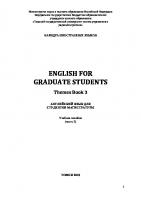
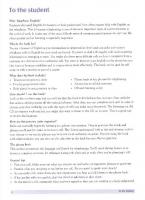

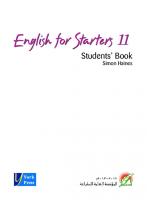
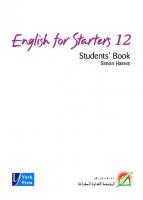

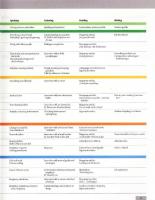
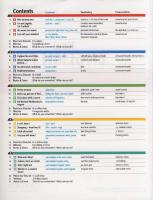

![New Total English Advanced Students' Book with Active Book Pack [2 ed.]
1408267144, 9781408267141](https://ebin.pub/img/200x200/new-total-english-advanced-students-book-with-active-book-pack-2nbsped-1408267144-9781408267141.jpg)
